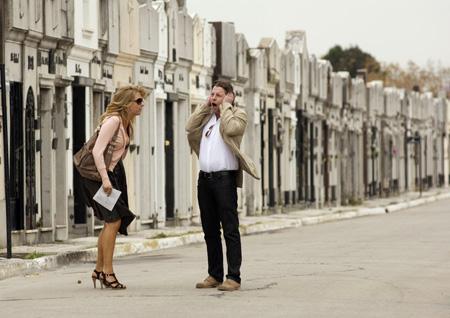"SuperClásico" is set in Buenos Aires, a fitting arena for a clash of cultures and a love triangle between an ambitious middle-aged Danish woman, her pathetic Danish soon-to-be ex-husband and her vivacious Latin lover – three characters that gain colour and depth as their stories unfold.
"The problem with our sorrow over love, divorce and loss is that we tend to make a claustrophobic prison for ourselves. This film tries to open that up."
The film takes its title from the annual Argentine football showdown between archrivals Boca Juniors and River Plate, an event the director describes as passion in its purest form. In diplomatic circles, the title also refers to "un caso clásico" – the Argentine term for the quite frequent cases of European women applying for residency in Argentina after falling for a (usually) younger and very hot Latin man.
LIFE IS A PARTY
Christian (Anders W. Berthelsen), the film's male lead, is a middle-aged Danish man who is going to seed. His wine store is going out of business and he is steadily drinking his way through the remaining inventory. His wife, Anna (Paprika Steen), a football agent, has met Juan Diaz (Sebastian Estevanez), a superstar player on the world-famous Argentine Boca Juniors team. Anna has now left her husband and teenage son in Denmark for a passionate, uncomplicated life of luxury in exotic Buenos Aires. But Christian hasn't returned the divorce papers and one day he decides to defy his fear of flying, jetting across the Atlantic with his son Oscar, in a last-ditch attempt to win back his wife – and his life.
"SuperClásico" is the final instalment in the trilogy that started with "A Love Story" and "Prague", the director says. "A Love Story", the seventh Dogme film, is a raw, challenging look at the lead-in to a break-up. "Prague", a beautiful, haunting drama, details the actual break-up and now "SuperClásico" looks at the post-break-up period. While "A Love Story" and "Prague" were intense chamber plays, "SuperClásico" mixes drama and comedy on a larger scale.
Madsen says he wanted to do a film about restoring masculine dignity, about a man who has to learn to pick himself up after a crushing blow. The director recently went through the divorce wringer himself. On the shoot in Prague, he fell in love with the actress Stine Steengade and later left his wife and two children.
"Normally, when you tell the story of a divorce, you focus on the time when you sit and nurse your emotional wounds," the 44-year-old Danish director says. "But after 'Prague', I learned that I had yet to tell the story of all the absurd and funny aspects of my own and others' lives that I find myself laughing at.
"SuperClásico". Photo: Shazia Khan
"Essentially, I wanted to tell a story about love. 'SuperClásico' is about different kinds of love. Every character we meet in the film has an idea about what love is. The problem with our sorrow over love, divorce and loss is that we tend to make a claustrophobic prison for ourselves. This film tries to open that up, put it into a bigger picture and view it in a highly cheerful light. It deals with very serious matters, but it insists on seeing the positive emotions of the situation."
Footballer Juan Diaz is a person who focuses on the bright side of life, the director says.
"He has a complete openness, great passion and a sense that life is fleeting and must be lived to the fullest. He has decided that his life is a party. We often make the opposite choice, the easy one. After all, it's easier to just nurse your wounds, as Christian has been doing for a year when the film opens."
FOOTBALL, WINE AND TANGO
"SuperClásico" is written by the director and screenwriter Anders Frithiof August. Buenos Aires was the perfect location for Madsen to convey the light-hearted tone he was after and capture the sensuality of the Argentine capital.
"Buenos Aires is an amazing city to experience and I wanted the film to communicate that. It's big, chaotic and overwhelming but also beautiful, absurd and poetic. And passionate! A form of passion that is unfamiliar to my protagonist," he says.
That changes, however, after Anne lets Christian and Oscar move into her house, where Juan Diaz likes to prance around the house butt-naked and a tango-dancing maid gives them a warm welcome! Christian and Oscar are both seduced and lose themselves in the hot, vibrant city with all its football, tango and wine.
In "SuperClásico", football is as a sounding board for the marital comedy-drama, which gave Madsen a chance to work with something he enjoys – the director is a devotee of football (and wine!).
"Spending time in Argentina has definitely given me a new perspective on the game of football," he says. "It's violent, wild, and crazy. I wanted that kind of passion to be reflected in this marriage. Argentina is a country of great passion, controlled passion simmering just below the surface."
Film critic Christian Monggaard talked to Ole Christian Madsen on the occasion of the film's Danish release.

